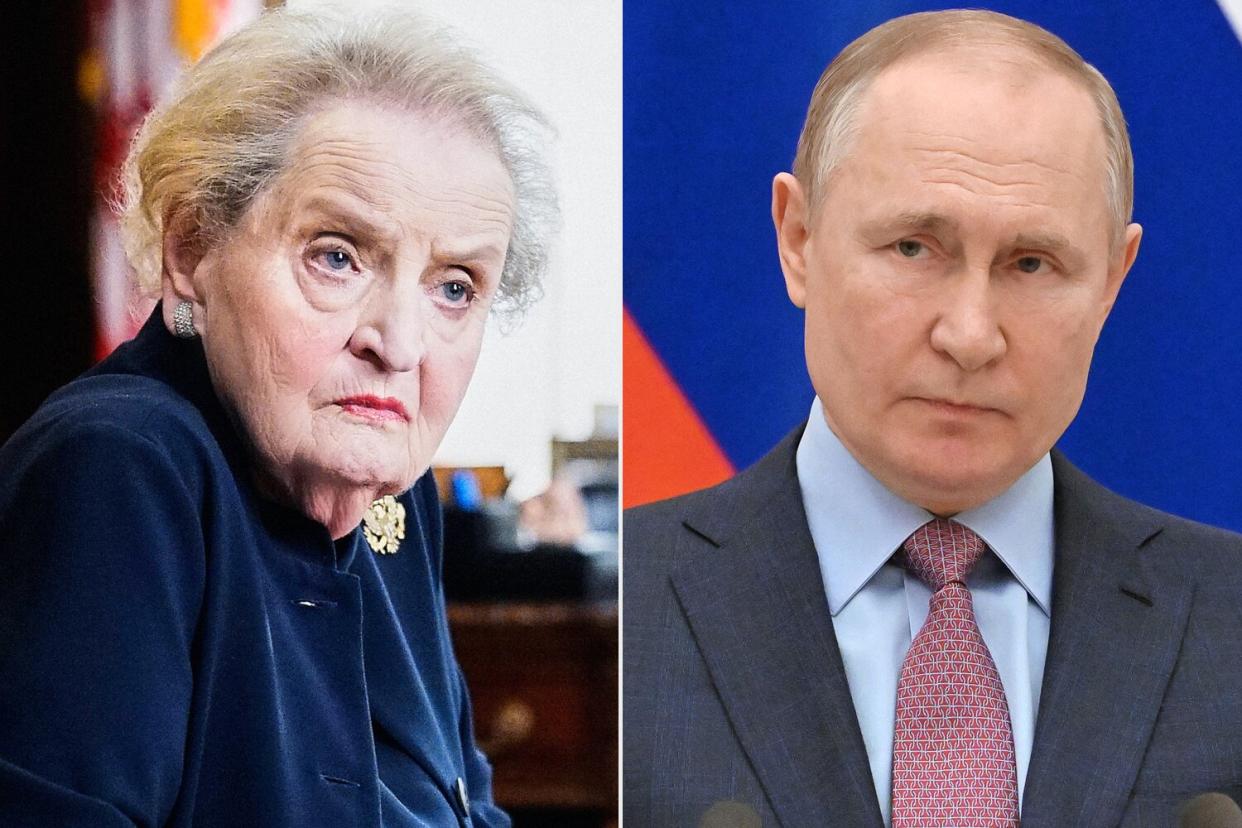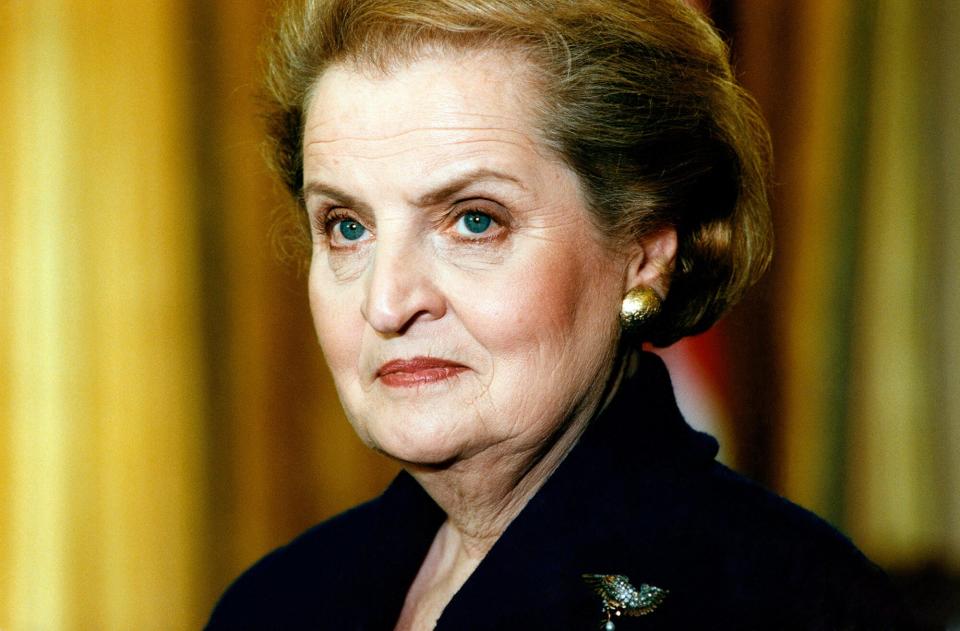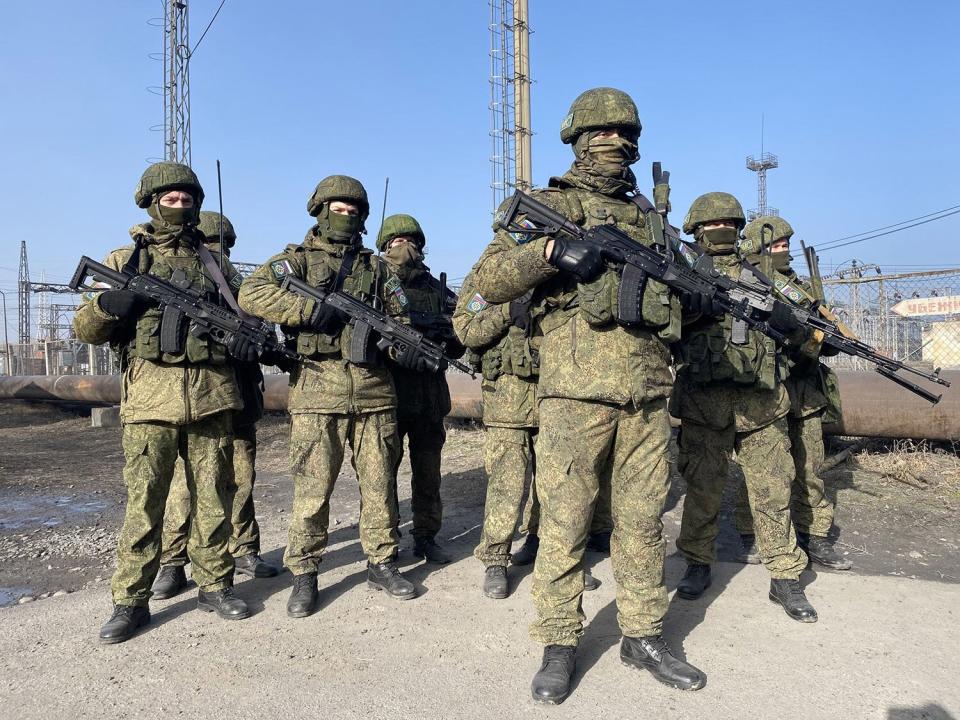Late Madeleine Albright Predicted Putin's 'Historic Error' in Final Op-Ed on Eve of Russia's Invasion

- Oops!Something went wrong.Please try again later.
- Oops!Something went wrong.Please try again later.
David M. Russell/CBS via Getty; SERGEI GUNEYEV/Sputnik/AFP via Getty
One month before she died, former U.S. Secretary of State Madeleine Albright predicted that Russian President Vladimir Putin's war in Ukraine would be a "historic error."
Albright, who died of cancer at 84 on Wednesday, wrote a final op-ed for The New York Times headlined "Putin Is Making a Historic Mistake" on Feb. 23, on the eve of Russia's invasion of Ukraine.
"I became the first senior U.S. official to meet with Vladimir Putin in his new capacity as acting president of Russia," Albright wrote in the piece of an early 2000 meeting at the Kremlin that lasted nearly three hours.
"Flying home, I recorded my impressions," she continued. "'Putin is small and pale,' I wrote, 'so cold as to be almost reptilian.' He claimed to understand why the Berlin Wall had to fall but had not expected the whole Soviet Union to collapse. 'Putin is embarrassed by what happened to his country and determined to restore its greatness.' "
For more on Madeleine Albright, listen below to our daily podcast on PEOPLE Every Day.
Albright referred to Putin's claim in a Feb. 21 speech that the eastern part of Ukraine included "ancient Russian lands," calling it a "revisionist and absurd assertion" that amounted to an "attempt to establish the pretext for a full-scale invasion."
RELATED: Madeleine Albright, Historic Secretary of State Under Bill Clinton, Dies at 84

Wally McNamee/CORBIS/Corbis via Getty Images Madeleine Albright
"Should he invade, it will be a historic error," Albright wrote two days later in the Times.
"Instead of paving Russia's path to greatness, invading Ukraine would ensure Mr. Putin's infamy by leaving his country diplomatically isolated, economically crippled and strategically vulnerable in the face of a stronger, more united Western alliance," Albright continued.
The former secretary of state also predicted that punishing sanctions would devastate the Russian economy "but also his tight circle of corrupt cronies — who in turn could challenge his leadership."
"What is sure to be a bloody and catastrophic war will drain Russian resources and cost Russian lives," she wrote.
Indeed, NATO estimated Wednesday that between 7,000 and 15,000 Russians have died in the month-long war as Ukraine defends against its attackers, the Associated Press reports.
The fighting has now shifted into a grinding battle for control of Ukraine's cities, with Russian forces stalled throughout the country.

RUSSIAN PRESIDENT PRESS SERVICE/HANDOUT/EPA-EFE/Shutterstock Russian President Vladimir Putin
"Instead of paving Russia's path to greatness, invading Ukraine would ensure Mr. Putin's infamy by leaving his country diplomatically isolated, economically crippled and strategically vulnerable in the face of a stronger, more united Western alliance," Albright wrote in her op-ed last month, adding that, "If Mr. Putin feels backed into a corner, he has only himself to blame."
Russia's attack on Ukraine continues one month after their forces launched their large-scale invasion on Feb. 24 — the first major land conflict in Europe in decades.
RELATED: Biden Calls Putin a 'War Criminal' as Aide Says He Was 'Speaking from the Heart'
Details of the fighting change by the day, but hundreds of civilians have already been reported dead or wounded, including children. More than 3.5 million Ukrainians have also fled, the United Nations says.
"You don't know where to go, where to run, who you have to call. This is just panic," Liliya Marynchak, a 45-year-old teacher in Ivano-Frankivsk, Ukraine, told PEOPLE of the moment her city was bombed — one of numerous accounts of bombardment by the Russians.

EyePress News/Shutterstock Russian soldiers
The invasion, ordered by Putin, has drawn condemnation around the world and increasingly severe economic sanctions against Russia.
With NATO forces amassed in the region around Ukraine, various countries have also offered aid or military support to the resistance. Ukraine President Volodymyr Zelenskyy has called for peace talks — so far unsuccessful — while urging his country to fight back.
Putin insists Ukraine has historic ties to Russia and he is acting in the best security interests of his country. Zelenskyy vowed not to bend.
"Nobody is going to break us, we're strong, we're Ukrainians," he told the European Union in a speech in the early days of the fighting, adding, "Life will win over death. And light will win over darkness."
The Russian attack on Ukraine is an evolving story, with information changing quickly. Follow PEOPLE's complete coverage of the war here, including stories from citizens on the ground and ways to help.
